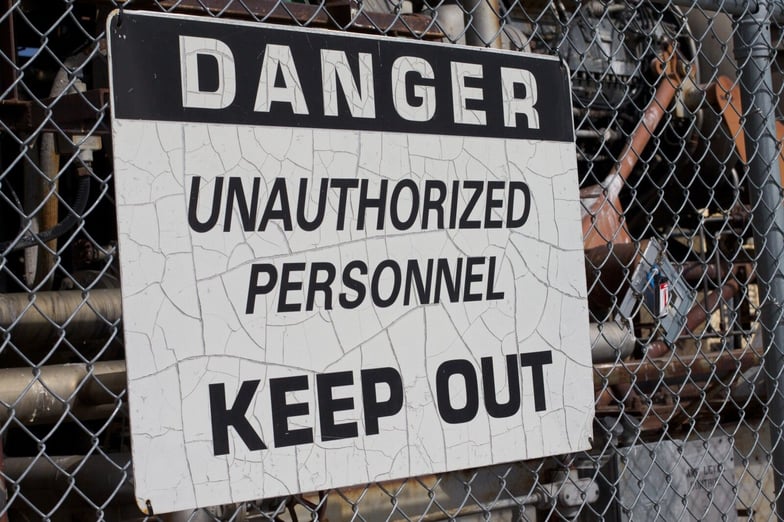Controlling church members are challenging. These people control or take the lead in situations to the point of being overbearing. We all know at least one of these types of people in our lives. If there are controlling people in your church, do you know how to deal with them... especially if they are in charge of events or are being ostracized by other people in the church? In this extensive guide, we give you helpful tips on how to spot these people in your congregation. We offer a look at how to resolve conflicts and even tell you how to handle controlling personalities.
1. Start by Noticing the Signs

You won't be able to effectively handle controlling church members (or even a single controlling church member) if you don't start with observation. Do you know the signs of a controlling church member?
Observe your congregation during sermons and church events. Does anything seem to be amiss? Are you unsure?
Here are a few signs that there's a controlling church member in your midst.
Other Church Members Avoid Them
This is a huge sign that something is wrong. If there's someone who's being ostracized in the church, it's possible it's because they're displaying controlling behavior.
No one likes to deal with a controlling person. Even the kindest and most accepting members of a church will only tolerate so much bad behavior before they're no longer willing to engage.
If you've noticed that one person (or one small group) is always standing alone, it may be for a reason.
Keep in mind that there are other possibilities here. The person could be a general bully or the problem could be with the other members of the church or they just like to be alone. This is just a good starting point.
They're Always "Taking the Lead"
It's great to encourage members of the church to be leaders, but being a leader isn't the same as being "bossy" or "controlling."
Is there always someone who's rushing to take control of every event? Do they try to organize all of the activities and delegate responsibilities? Is it actually delegating, or are they bossing others around being controlling church members?
Someone who's delegating will encourage others to do their part while also taking their wants and needs into consideration. Someone who's being bossy, however, will only consider their own desires.
Pay close attention to the people who is always "leading" the way.
They Talk Over Others
This is a huge red flag when it comes to bossy or controlling people. Instead of sitting back and listening when appropriate, they speak over others.
Mature and responsible people will speak when it's their turn to do so, even in heated or emotional discussions. Controlling church members may even start to speak over church leaders alongside regular church members.
They Don't Accept Criticism
Any good leader can accept blame and criticism when it's appropriate. A controlling person doesn't have this ability. Accepting blame and criticism is harmful to their ego.
If someone is reactive when another church member has something critical to say about how they "lead," even if it's constructive criticism, it's a sign that they're controlling.
Other Church Members Have Complained
This is the most obvious sign of controlling church members. If other members of the church have come to you with complaints, take them seriously.
It's possible that the complaints are unfounded, but this is a sign to pay closer attention. Always address the concerns instead of dismissing them.
2. Address the Group
Once you think that you have a controlling person in your church, address the group. Do it with kindness and patience and make sure that you're not "calling anyone out." You don't want the controlling person to feel attacked or unwelcome.
Talk to the group in a general way about how they should handle activities and interactions with one another. Instead of calling out bad behavior, try listing examples of good behavior they can follow.
This way, you're leading with positivity.
3. Include It in Your Sermons

Can you think of a way to include this in your sermons? This can be an effective way to nip controlling behavior in the bud without being too direct or calling anyone out specifically.
Preach about kindness and cooperation. Explain how these things can help someone with their faith.
Most people inherently know that being bossy or controlling isn't kind, but they might need a brief religious reminder about what they should be doing instead.
4. Create and Distribute an Updated Code of Conduct
 If you're looking for another subtle way to discourage toxic behavior from controlling church members without having to make direct contact with the offender, or even if you're not sure who the offender is, consider crafting and distributing a new code of conduct.
If you're looking for another subtle way to discourage toxic behavior from controlling church members without having to make direct contact with the offender, or even if you're not sure who the offender is, consider crafting and distributing a new code of conduct.
Include examples of good and bad behavior. List traits that all members of the church should be trying to display at all times.
Consider creating specific guidelines for church events and activities as this is where controlling people tend to display their bad behavior in the most obvious ways.
This is a great addition to your next church newsletter.
5. Lead By Example

Always aim to lead by example (and encourage other church leaders to do the same). Sometimes the best way to get rid of bad behavior is to display good behavior.
Show your congregation what leadership should look like. Consider creating examples of opportunities to be a good leader.
For example, show what it looks like when you delegate responsibilities to members of your church. Ask them questions about the responsibilities they're able to handle and ask them about their personal interests.
This is a great way to encourage others to follow your lead. Remember: it's possible the controlling church members were unaware they were displaying bad behavior. They just need someone to look up to!
6. Set Up Group Committees
 If one person is always taking control of various activities or events, fix this problem by delegating responsibilities on your own. Don't give the controlling person the opportunity to take over.
If one person is always taking control of various activities or events, fix this problem by delegating responsibilities on your own. Don't give the controlling person the opportunity to take over.
Good leadership will set up small groups to lead activities and events instead of only choosing one person. If the controlling person still wants to lead, they're going to have to learn how to collaborate with others. They may still display controlling behavior while they're in a group, but the rest of the group should keep things more balanced.
Try to balance out controlling group members with other churchgoers who are firm, kind and good leaders. When you pair controlling people with passive people, you may make the problem worse.
It's a good idea to have group sessions to discuss event responsibilities with everyone so they're all on the same page and the controlling person knows they're unable to delegate new responsibilities to others.
7. Talk One-On-One with the Offenders
 If you're unable to put a stop to the behavior in a subtle way, you might have to have a firm one-on-one conversation with the controlling person. This might feel awkward, but it can make a huge difference.
If you're unable to put a stop to the behavior in a subtle way, you might have to have a firm one-on-one conversation with the controlling person. This might feel awkward, but it can make a huge difference.
Take them aside and calmly talk about your concerns. Avoid mentioning any other members of the church by name. You don't want the controlling person to retaliate against them.
if the person was unaware that their behavior is unacceptable, this might be a great wake-up call for them. The controlling church members will be able to see the error of their ways and immediately strive toward change.
If they're resistant to this conversation (remember, controlling people often have a tough time accepting blame or criticism), this might be more complicated. Make sure that you come prepared with a list of things that you've noticed so that they can see specific examples and address them.
Try to do this during a calm time. Schedule the chat ahead of time so you don't disrupt the person's schedule. This could make church members more disgruntled.
8. Try to Understand Their Motivation
Most people who are controlling have some kind of "inner wound" or emptiness that they're trying to fill. It might be the result of a past life event.
Many people who display controlling behavior feel as if they don't have control over other areas of their life. They may struggle with anxiety so they try to control what they can. When they're given an opportunity to tell others what to do, they take it because they're so used to being told what to do.
Often, these people feel inferior (even if the opposite seems to be true). This is why they struggle so much with criticism. They crave praise and acceptance, but they don't know how to seek it out in productive ways.
It's also possible that they just have a lot of big ideas that they're not sure how to implement. They think that other people are doing it wrong because they're not matching the vision that they have in their head.
Knowing why someone is doing something will help you address it more effectively.
9. Give the Controlling Church Members Something to Do
 Idle hands are the devil's playthings. When you give the controlling members of the church a task that doesn't allow them to exert control over others, you might be pleasantly surprised.
Idle hands are the devil's playthings. When you give the controlling members of the church a task that doesn't allow them to exert control over others, you might be pleasantly surprised.
Give them a simple task that still has some level of importance. Give them clear instructions that they shouldn't deviate from, but make sure that they have the freedom to be creative as well.
For example, you could have them find the venue for your next church bake sale. This activity doesn't involve delegating responsibilities to others but it's still important.
You should also try to find tasks that will encourage them to lift other people up. Let them come up with their own events and activities. This can make them feel empowered.
People who aren't given tasks will look for things to do, and those things might not be acceptable to the other members of the church.
10. Inspire Them to Express Themselves in Better Ways
![]() This is another opportunity to lead by example. Teach and inspire your problematic church members how to express themselves in more acceptable and productive ways.
This is another opportunity to lead by example. Teach and inspire your problematic church members how to express themselves in more acceptable and productive ways.
Talk to them about how much they can gain from collaboration. Wouldn't the church bake sale go more smoothly if they worked together with the other members of the church to collaborate on tasks? Wouldn't it be easier for them if they let other people take control every now and again?
If possible, try having other good leaders work with them to show the benefits of collaboration instead of control.
11. Praise Good Behavior
 After some time, even the most controlling church members will start to display better behavior. Everyone is capable of growth and learning. It might take a lot of effort on your part, but it will be worthwhile. Encouraging bad behavior and not praising the good can lead to a decline in church members.
After some time, even the most controlling church members will start to display better behavior. Everyone is capable of growth and learning. It might take a lot of effort on your part, but it will be worthwhile. Encouraging bad behavior and not praising the good can lead to a decline in church members.
So, once you start seeing good behavior, praise it! Let the controlling person know how well they're doing. Give extra praise after they "lead" events that are successful.
When you show them more praise for good behavior, they'll feel motivated to continue working hard.
12. Get Involved
If you're still struggling, take a more "hands-on" approach to church events and activities. It's good to let members of the church take the reins from time to time, but if someone isn't able to conduct themself well, you can take the lead instead.
Even leading a single activity can make a huge change. You'll be displaying your own good leadership skills which will inspire others to follow you. You'll also ensure that your event or activity will be a success.
When you delegate responsibilities, check in with your groups frequently. This will give you an opportunity to observe any problematic (or good) behavior and step in if it's necessary to do so.
13. Explain Their Impact
Many people don't understand the impact that they have on others (positive or negative). The controlling person in your church may not understand that their behavior is harmful to other churchgoers and the church as a whole.
Talk about ways in which their behavior negatively impacted the people around them or the events that they took control over. How could positive behavior have been more effective?
Sometimes knowing the "why" is enough to make a change.
Get Everything Church Leaders Must Know in One Free Guide
Get the tested church leadership strategies and techniques used by top ministries to build healthy and growing congregations. Download our free eBook to learn…











